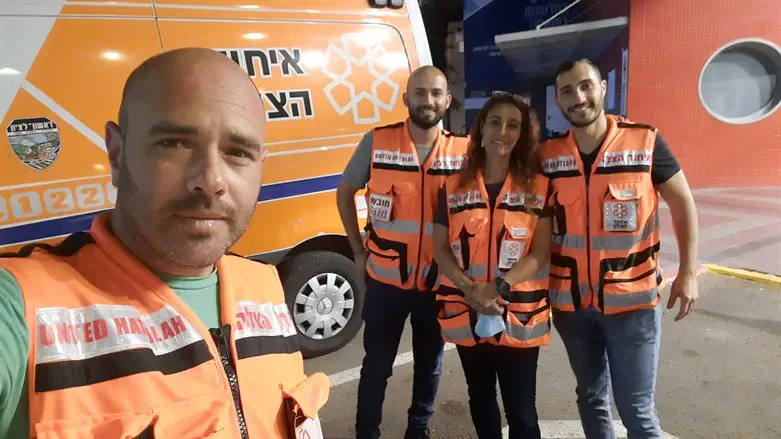
On Sunday, a few minutes before midnight, a 77-year-old woman was found by her caretaker unconscious in her bed in Rishon Lezion. The caretaker was distraught and frantically called the woman’s son to help her. As soon as he heard the news, he hung up the phone and dialed emergency services to help.
Oren Rosfasha, a United Hatzalah volunteer EMT, was on shift with one of the ambulances from the organization and was driving nearby when he received the alert together with the rest of his team. Oren is not only a first responder, but he also volunteers during his free time in the Shamir Medical Center (Assaf Harofeh) as part of the organization’s emergency room relief project. Kuka Bitan, a volunteer EMT from Modi'in, was on the ambulance together with Oren, along with Dvir Geriani and Eliad Shimol.
Oren, Kuka, and the other responders in the ambulance rushed over to the given address, arriving in just three minutes. However, as they looked for the house, they soon figured out they had the wrong address.
Oren explained, “Our emergency lights were flashing, other first responders on their motorcycles started to show up, people were running around, we were all searching for the correct address, but no one could find it. We called dispatch and asked for a clarification of the address, a little after midnight. A few minutes later, we received clarification of the correct location and went on our way. We felt bad that the neighbors were left in confusion from the commotion we had caused and were probably very worried. It's also nerve-racking when we are delayed to an emergency because we always try to arrive as fast as we can.”
The ambulance arrived at the address, and the volunteers jumped out and ran inside the building. Some took the elevator, and some ran up the stairs.
The woman was lying in her bed unconscious, not breathing, and without a pulse. Her caretaker was crying in worry and fear. When Kuka saw the terrible emotional state the caretaker was in, she led her outside of the room as the team carefully drew the woman out of her bed and gently placed her on the floor so that they could begin CPR.
Kuka sat the caretaker down in a location where they could not see the CPR underway and offered her some water so she could relax.
“I saw that the woman required emotional support, and there were enough EMTs to perform the CPR without me, so I took the woman aside to calm her down. She was crying uncontrollably because she was afraid that the woman would die. She didn’t speak Hebrew, but I think she understood me as I explained to her with hand motions that we were there to help.”
Once the caretaker was visibly more relaxed, Kuka joined the others in the CPR efforts. The EMTs were crowded around the woman on the living room floor. An ambo oxygen mask and a defibrillator were already connected, and a paramedic had administered three doses of adrenaline.
After 20 minutes, the woman’s pulse returned and stabilized. The combined EMS team prepared the woman for immediate transport to the hospital and carefully placed her on a backboard with a neck brace to protect her neck and spine and an artificial respiration device to keep her ventilated during the transport.
“Saving the woman’s life was a great way to finish our ambulance shift, said Kuka. “It was definitely the cherry on top. We had responded to five other emergencies on Sunday night, and this successful resuscitation was the last one. It left us all with an adrenaline boost as high as the sky and I am thankful that I was able to be there and help both the woman and her caretaker. I think it is absolutely important to not only treat the patient suffering the emergency, but help provide emotional stabilization for others who are affected by the emergency as well, that too is a cherry on top.”
